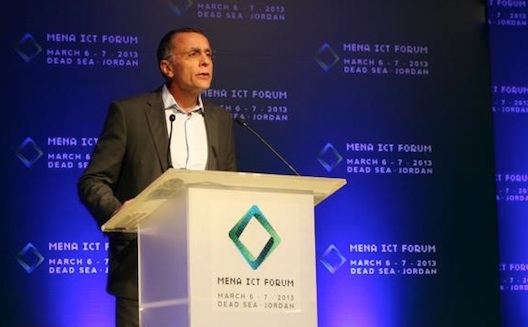10 Trends Shaping the Future of Business in the Arab World, from Fadi Ghandour

 At the MENA ICT Forum in Jordan this past week, Fadi
Ghandour, Vice Chairman and founder of Aramex, and Chairman of the
Board at Wamda, kicked off the second day with a focus on major
trends facing the Arab world today.
At the MENA ICT Forum in Jordan this past week, Fadi
Ghandour, Vice Chairman and founder of Aramex, and Chairman of the
Board at Wamda, kicked off the second day with a focus on major
trends facing the Arab world today."With everything going digital, connectivity is a must and broadband is a human right," he explained, to the crowd of tech entrepreneurs, investors, and policymakers.
Here are 10 of his predictions for the ways that technology, education, and entrepreneurship will shape the future of the Arab world.
- Learning and education in the Arab world will
change. The need for education reform hardly an issue
exclusive to the Arab world. To give an example of how outdated
models no longer apply around the world, Ghandour pointed to the
fact that early in his career, Joichi Ito, who is now one of the
world’s leading thinkers on innovation and technology and director
of the MIT Media Lab, was automatically rejected when applying to
companies because he had no college degree. Globally, hierarchal
organization is becoming history, and technology is changing how we
think about education.
- E-commerce is on the rise. With 100 Million
Arab users online, “e-commerce is it!,” he said. It doesn’t hurt
that payment gateways are spreading, PayPal is
expanding in the region, and the biggest online
retail players- Namshi, MarkaVIP, and Souq- have received a
collective injection of close to $100 million over the past year,
as international investors bet on e-commerce in the Middle
East.
- Commerce will continue going social. With
social platforms such as Facebook, Twitter and Google+, online
businesses are becoming inherently social, and are more able to
receive instant feedback from customers and respond quickly to
customer needs by having active social engagement policies. It's no
longer an option but a must.
- Jobs will become more flexible and less
secure. “Ten years ago, Facebook didn't exist. Ten years
before that, we didn't have the Web. So who knows what jobs will be
born a decade from now?” Ghandour said. Quoting a Time Magazine
feature called The
Future of Work, he pointed to the idea that in the future jobs
will become more flexible, more freelance, and less secure, and
women will increasingly be at the front.
- Corporate structures are becoming
decentralized. Today, organizations and companies are
adopting democratized social structures and becoming increasingly
decentralized. Continuous on the job training and education is a
crucial component for talent retention; every company should have
an education institution in its core to keep its talent.
- People will increasingly congregate based on
interests. “Borders are obsolete, and sovereignty is
overvalued,” Ghandour said. From Occupy Wall Street to Tahrir
Square, common interest is mobilizing people globally, not their
sense of nationality. In a globalized world, that trend will
continue.
- Small and medium-sized enterprises (SMEs) will lead the
way. SMEs are fast, agile, lean and are always generating
new ideas. Especially with broadband, cloud services, and the
latest technologies, they will be able to grow quickly and eat
market share, he said. As he’s said when explaining Corporate Entrepreneurship Responsibility, a
new movement for galvanizing the private sector to boost
entrepreneurship, formal SMEs in the Middle East and North Africa
account for an
average of 30% of all private sector employment, and will
continue to be a part of the solution for job creation.
- E-Government will grow. Governments must
become more digital and interact with their citizens online to keep
up with the fast pace of change.
- Social activism will become easier in the digital
age. Non-state actors, business leaders, academics,
students and all citizens are as equally as important as the
government, especially as technology empowers individuals and
increasingly transforms social activism. The crowdsourcing map
movement, beginning with Ushahidi’s role in mapping violence
during the Kenyan elections in 2007, and continuing to those that
map harassment incidents in Egypt and elections in Jordan, will
continue to enable social activists.
- Avoiding information overload will be one of our biggest challenges. A Reuters report called “Dying for Business” revealed that information overload causes 33% of managers become sick, is the cause of 66% of tensions between colleagues, and causes delays in decision-making for 43% of those polled. One of the critical ways to survive will be to filter information that’s relevant to us and to our lives.


